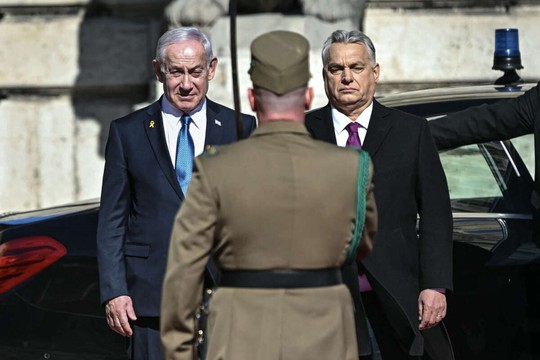Hungarian Prime Minister Viktor Orbán (right) welcomes Israeli Prime Minister Benjamin Netanyahu (left) on April 3, 2025, in Budapest, Hungary.
Photo: AFP
The International Criminal Court (ICC) is now formally investigating Hungary’s refusal to fulfill its legal obligation to arrest Netanyahu and send him to The Hague. States parties to the Rome Statute have a duty to cooperate with the court and facilitate the arrest of any ICC suspect who enters their territory. Although Orbán announced Hungary’s withdrawal from the statute on April 3, it does not take effect for one year.
Hungary’s move comes as more ICC members are threatening not to comply with their duties as well. Other U.S. allies in the European Union that are states parties to the Rome Statute — including France, Germany, Italy, Poland and Romania — have either indicated that they will refuse to uphold their obligations to arrest Netanyahu, or have refused to promise that they will enforce the court’s arrest warrant.
On November 21, 2024, Pre-Trial Chamber I of the ICC issued arrest warrants for Netanyahu and his then-Defense Minister Yoav Gallant for war crimes and crimes against humanity committed in Gaza from at least October 8, 2023 to May 20, 2024 (the day the ICC prosecutor applied for the warrants).
The chamber found reasonable grounds to believe that Netanyahu and Gallant were co-perpetrators of the war crime of starvation as a method of warfare, because they “intentionally and knowingly deprived the civilian population in Gaza of objects indispensable to their survival, including food, water, and medicine and medical supplies, as well as fuel and electricity.” The chamber noted that the two men impeded humanitarian aid and failed to facilitate relief.
In addition, the chamber found reasonable grounds to believe Netanyahu and Gallant are criminally responsible as civilian superiors for the war crime of intentionally directing an attack against the civilian population.
At least 51,000 Palestinians have been killed since October 7, 2023, a number widely considered to be an undercount, with thousands more missing under the rubble. It has now been 51 days since any humanitarian aid has entered Gaza.
When the ICC learned that Netanyahu had arrived in Hungary on April 3, it asked Hungary to effect a provisional arrest of the Israeli leader. Article 59 mandates that “A State Party which has received a request for provisional arrest or for arrest and surrender shall immediately take steps to arrest the person in question.” But although Netanyahu remained in Hungary for three days, Orbán refused to arrest him.
At the time the ICC issued the arrest warrant for Netanyahu, Orbán said it would have “no effect” in Hungary. Orbán’s announcement about Hungary’s withdrawal from the Rome Statute came shortly after Netanyahu arrived in the country. But that withdrawal has no bearing on the current proceedings in the ICC.
That is because Article 127 specifies that, “The withdrawal shall take effect one year after the date of receipt of the notification, unless the notification specifies a later date. A State shall not be discharged, by reason of its withdrawal, from the obligations arising from this Statute while it was a Party to the Statute.”
The investigation into Hungary is the third time within a year that the ICC has opened an inquiry into a state party for refusing to arrest suspects. In October 2024, the court cited Mongolia for welcoming and failing to arrest Russian President Vladimir Putin who is under an ICC arrest warrant for war crimes in Ukraine. And in February, the court asked Italy why it sent a Libyan man accused of murder and torture back to Libya instead of arresting him.
On February 6, Donald Trump issued an executive order imposing sanctions on the ICC and Chief Prosecutor Karim Khan for prosecuting Netanyahu. The executive order says that any non-U.S. person or organization can be sanctioned if they directly assist any effort of the ICC to investigate, arrest, detain or prosecute a “protected person” without the consent of that person’s country of nationality.
After Trump issued his executive order, Orbán supported the sanctions and ordered a “review” of Hungary’s relationship with the ICC. The review came as nearly 80 countries signed onto a joint statement in support of the ICC, though some of those countries, such as France and Germany, have suggested they would not arrest Netanyahu themselves.
…The system of ICC, which Western countries have often used for their political interests, is no longer working.
The ICC acted mainly against those who were “enemies” of the West. The system was vividly unfair. Now the ICC dared to touch a friend of the USA, and the attempt has failed.
Once the system was a manifestation of Western political interests – now there are new political interests in new historical conditions.
read more in our Telegram-channel https://t.me/The_International_Affairs

 10:53 25.04.2025 •
10:53 25.04.2025 •























